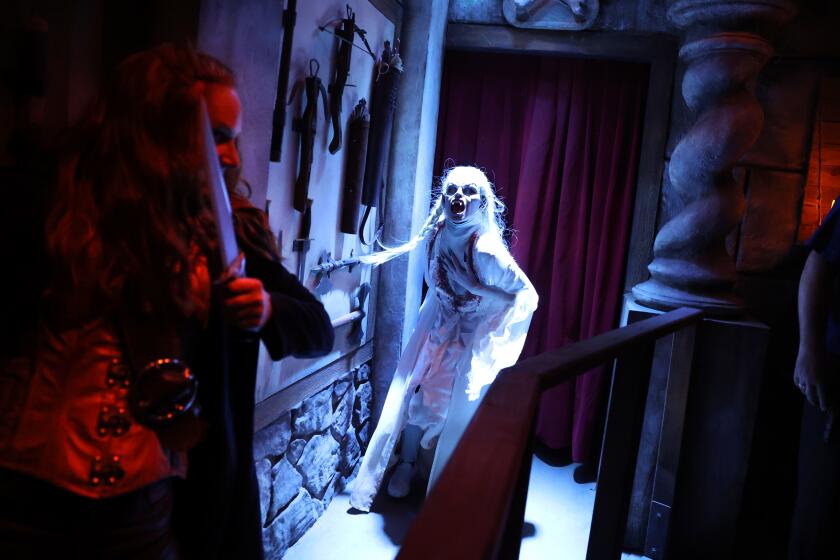Japan Aims to Right Tourist Imbalance
Japan, land of Mt. Fuji, cherry blossoms, temples and robots. Unfortunately for the nation’s hospitality industry, many foreign tourists would add to the list: too far, too expensive and too difficult to understand, linguistically and culturally, amid fears one could offend an entire village by holding a teacup the wrong way.
“Many people just don’t think of coming here,” said Hisao Yoshimura, planning manager of the Japan Travel Bureau, the nation’s largest travel agency.
Between three and four times as many Japanese travel abroad as the other way around, with the United States an even greater mismatch at 7 to 1. More foreign tourists visit Poland, Macao or Croatia each year than Japan, the world’s second-largest economy.
In a bid to narrow the gap, on April 1 Japan will launch a national campaign, crafting slogans, building Web sites, hiking promotion budgets and setting a target of luring 8 million tourists by 2007, up sharply from the 5 million in 2002. The program will cost at least $16 million.
For decades, Japan didn’t care much about the tourism imbalance. Recently, however, as local economies across the nation deteriorate and a less confident Japan worries about its imprint on the world, the government has made it a priority.
Among the biggest deterrents for overseas visitors, according to experts and tourism surveys, is cost. Tokyo and Osaka consistently top annual lists of the world’s most expensive cities. Department stores still shock browsers with $100 melons, and budget travelers sometimes find themselves living on noodles to stretch their budgets.
Promoters are trying to cobble together discounts on hotels, trains and air fare to counter the sticker shock some visitors face. A decade-long recession, years of deflation and a weaker yen also are chipping away at price tags.
“It’s expensive, but I sort of expected it,” said Gabriel Hernandez, a 31-year-old optometrist from Los Angeles on his first visit. “And it’s very clean here.”
Location is another impediment, particularly for Europeans and Americans. There’s often a 10- or 12-hour flight, followed by airport formalities, jet lag and the long ride into Tokyo, say, from Narita airport.
“We’re both rather tall and had to keep getting up and stretching on such a long trip to avoid economy-class syndrome,” said 6-foot-7-inch Jon Ramster, a 29-year-old Web developer from England on his first visit to Tokyo with his 5-foot-7-inch girlfriend. “I’m really amazed how few foreigners you see here.”
Finally, there’s Japan’s famously unique way of doing things. Although the country’s rich culture is one of its big attractions, Japan’s reputation for formality and exacting ways can be a bit daunting for the uninitiated, travel experts say. A recent report by the Japanese Assn. of Corporate Executives on making the country more accessible to foreign tourists, students and workers said discrimination and insularity were hurting efforts to broaden Japan’s appeal.
“I’m not sure I would recommend it to my friends,” said Katya Aronni, a 31-year-old Italian and first-time visitor touring Tokyo’s posh Ginza district with several friends. “Everything seems a bit indirect, like you have to go from side to side just to go straight.”
Japan has a lot going for it that’s not appreciated, counters the government’s Land and Transport Ministry, adding that a significant increase in foreign tourists would improve the country’s image, boost local employment and increase national pride.
Asia is the most promising source for more visitors, given its proximity and neighbors’ interest in Japanese pop culture, celebrities and economic advances. The northern Japanese island of Hokkaido recently launched a campaign in Taiwan and Hong Kong selling itself as “Europe a short distance away.”
But experts say Japan could do a lot more to encourage overseas tourists. In the past, many innkeepers made no bones about their preference for local customers, who spend more, know the system and offer no language barrier.
Akio Ishii, a tourism industry professor at Rikkyo University, said that when he called a Japanese hotel on behalf of visitors, the hotel initially said it had lots of room before learning the guests were from abroad and suddenly announcing it was full.
“Unfortunately, the tourism industry hasn’t always welcomed foreign visitors,” Ishii said.
Many who make the trip here, however, say they’re pleasantly surprised, citing the polite and relatively safe nature of the country and its natural beauty.
“Japan is very friendly,” said Aki Luu, 26, a dentist visiting from the Tampa Bay area of Florida. “I really don’t agree with the critics.”
Ramster, the Web developer, observed, “The bullet trains here are just incredible.”
*
Takashi Yokota in The Times’ Tokyo Bureau contributed to this report.
Sign up for The Wild
We’ll help you find the best places to hike, bike and run, as well as the perfect silent spots for meditation and yoga.
You may occasionally receive promotional content from the Los Angeles Times.



